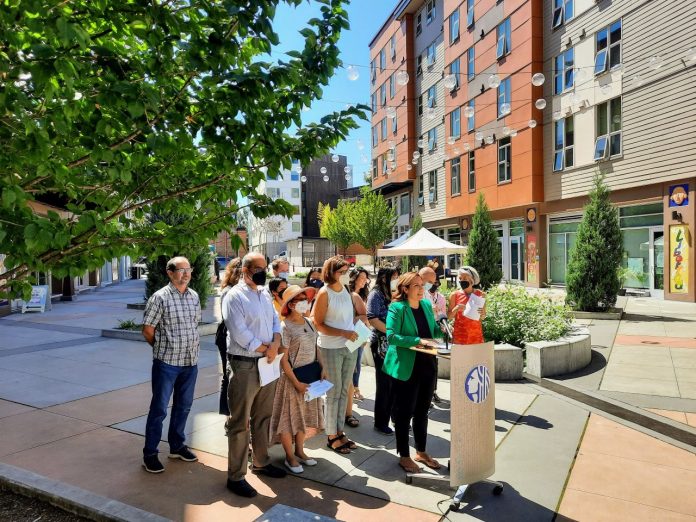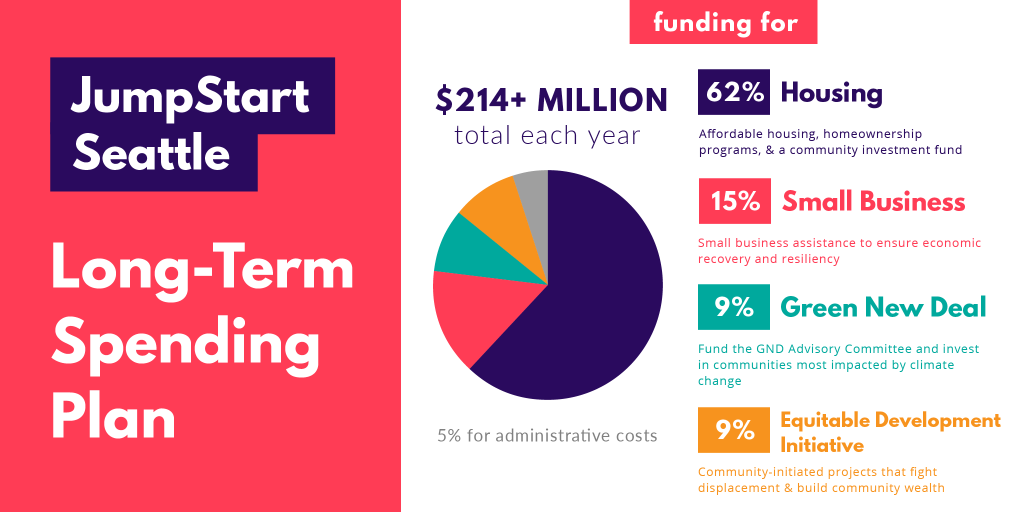
JumpStart scored another victory last week. After facing a string of defeats in its legal challenges, the Seattle Metropolitan Chamber of Commerce revealed last Monday they would not be pursuing further legal action to block the JumpStart progressive payroll tax passed by the Seattle City Council in 2020. The Washington State Court of Appeals upheld JumpStart in June, which left the chamber with the Washington State Supreme Court as their remaining legal recourse.
In a message to chamber members, chamber President and CEO Rachel Smith said her organization would not be pursuing that option since a different outcome is unlikely, as the State supreme court expected to side with the Court of Appeals or turn down the case altogether, Marc Stiles of the Puget Sound Business Journal reported. Instead, she said the chamber would be pivoting to “a fresh strategy” seeking “a city budget that aligns with priorities and delivers action on public safety, affordability, and homelessness.”
Ironically, if the chamber appeal had succeeded, funding to house the homeless would have been dealt a blow.
With its legal soundness confirmed, JumpStart is poised to continue to raise revenue from the largest corporations in Seattle and invest it in affordable housing and Green New Deal priorities for at least two decades to come. The tax sunsets in 2041, barring action by the City Council to extend it. JumpStart revenue has been beating initial projections, with the City revising its projection up to $277 million in 2022.
On Thursday, Councilmember Teresa Mosqueda, who authored JumpStart legislation, held a press conference with nonprofit leaders announcing $80 million in JumpStart housing awards that will fund projects creating or preserving 1,769 homes. Mosqueda stressed that these 20 projects coming online will follow community visions and meet community needs by including family-sized units and on-site services, such as daycares or education and job centers for youth who’ve experienced homelessness.
In addition to noting the legal win, Mosqueda said that JumpStart continues to be popular with Seattle voters.
“This week we see JumpStart continuing to be the law of the land here in Seattle for years to come,” Mosqueda said. “We’ve already won twice in the courts, and we continue to win in the court of public opinion because two-thirds of Seattleites support JumpStart. And we’re here to show exactly where those funds go.”
The majority of projects announced were new builds, while 312 homes were listed under rehabilitation in a handout prepared by City Council staff. The beneficiaries include a wide swath of nonprofit homebuilders including Chief Seattle Club, LIHI, YWCA, El Centro de la Raza, Community Roots Housing, DESC, and Mount Baker Housing Association. These awards generally stack on top of other awards, including those from the Seattle Office of Housing, which distributed funds from the Seattle Housing Levy and Mandatory Housing Affordability program.
The press conference was held at Plaza Roberto Maestas, a public plaza lined with vendors and located between affordable housing and a community center and childcare center managed by El Centro de le Raza. The complex is just steps from light rail at Beacon Hill Station, and it has been an anchor against displacement in a neighborhood seeing huge jumps in housing prices.
Newly installed Office of Housing Director Maiko Winkler-Chin said JumpStart funds have more flexibility than other funds, which she said can help nonprofits work with communities and overcome obstacles to get projects off the ground. She credited JumpStart’s community determination fund with offering a better way for communities of color to partner with nonprofit builders.
Filipino Community Center’s Velma Veloria (a former State Rep. in the 11th) said JumpStart would help her nonprofit obtain land to build family-sized affordable housing, which had been a big hurdle for them. “We’re excited that we can move forward to secure the land and build housing that will help root the Filipino community in place,” Veloria said.
Likewise Miguel Maestas, housing and economic development director at El Centro de la Raza, said his organization would be focusing on family-sized affordable housing and community building in their JumpStart-funded project in Columbia City.
“We are excited for the future and what JumpStart funding will provide to our city and communities,” Maestas said. “This is an incredible asset and supports smaller organizations in building capacity and creating affordable housing that are truly long-term assets that will serve and strengthen communities.”
Even with the JumpStart infusion, Mosqueda said more investment is needed, pointing to the McKinsey report that estimated King County would need to spend a billion per year for a decade to bring the homelessness crisis to an end.
State Rep. Nicole Macri said the state legislature made its largest ever affordable housing investment earlier this year — $708 million over the biennium — and said they’d look to continue to expand those investments and also grapple with exclusionary zoning that is limiting housing diversity in communities across the state. Despite a big push led by Rep. Jessica Bateman (D – Olympia), the state legislature failed to pass statewide “missing middle” housing reform this session, but housing advocates are hoping for better luck next year.
Some jurisdictions are contemplating passing zoning reforms on their own accord, and notably Spokane just went and ahead passed missing middle reform that will allow for fourplexes in single-family zones. Housing advocates are hoping Seattle will follow suit as it scopes out its growth strategy for the Major Update to its Comprehensive Plan due in 2024. Doing so would provide yet more opportunities to expand affordable housing options.
Doug Trumm is publisher of The Urbanist. An Urbanist writer since 2015, he dreams of pedestrian streets, bus lanes, and a mass-timber building spree to end our housing crisis. He graduated from the Evans School of Public Policy and Governance at the University of Washington in 2019. He lives in Seattle's Fremont neighborhood and loves to explore the city by foot and by bike.



